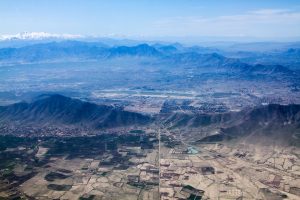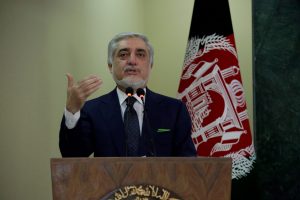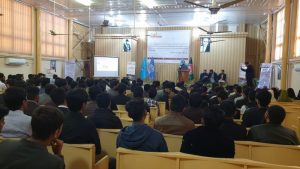Making infrastructure transparent is essential and the CoST process helps to do just that. It provides us with information on all types of projects, it helps to ensure people are engaged and they are the real owners of the infrastructure
H.E. Abdullah Abdullah, Chief Executive of the Government of Afghanistan
Prior to CoST: public infrastructure in context
High levels of financial waste are frequently observed on public construction projects in post-conflict states, which can suffer from corruption and a lack of adequate monitoring mechanisms.  Afghanistan’s road construction in particular is a major absorber of aid money and with a lack of monitoring mechanisms in Afghanistan, high levels of financial waste have been recorded in public construction projects. For instance, the cost of upgrading Kabul’s symbolic airport road, Bibi Mahro, was estimated to be ten times that of other road projects in the country.
Afghanistan’s road construction in particular is a major absorber of aid money and with a lack of monitoring mechanisms in Afghanistan, high levels of financial waste have been recorded in public construction projects. For instance, the cost of upgrading Kabul’s symbolic airport road, Bibi Mahro, was estimated to be ten times that of other road projects in the country.
In 2012, the government made a series of commitments to fight corruption and improve governance at the Tokyo Conference on Afghanistan. These commitments form the backdrop to various efforts aimed at improving transparency in the country, including joining CoST. The Government of Afghanistan has also embarked on legislative reform in recent years to counteract corruption, including the Afghan Access to Information Law in 2014 and procurement legislation reform in 2015.
CoST Afghanistan: how it all began
Afghanistan embarked on CoST membership in 2013 after recommendations made by the Afghanistan Joint Anti-Corruption Monitoring and Evaluation Committee on the need for greater transparency in the infrastructure sector, alongside an Executive Decree passed by President Hamed Karzai in 2012, which focussed on the fight against corruption. A Memorandum of Understanding (MoU) was signed between the CoST International Secretariat and the Ministry of Economy, and since then the Ministry has championed CoST in government. The National Secretariat of CoST Afghanistan started its activity in 2016 and is hosted by Integrity Watch Afghanistan.
The four features of CoST
The CoST approach is focussed on four core features: disclosure, assurance, multi-stakeholder working and social accountability. These features provide a global standard for CoST implementation in enhancing infrastructure transparency and accountability.
Disclosure in Afghanistan
The disclosure process ensures that data about the purpose, scope, costs and execution of infrastructure projects is open and accessible to the public, and that it is disclosed in a timely manner.
CoST Afghanistan produced a scoping study in 2017 which found there were challenges on both the supply and demand side of information and accountability. Regarding the latter, an estimated illiteracy rate of 70 percent and a highly rural population limits the capacity of the media, civil society and citizens to use information to hold the government to account. On the supply side, the continuing flow of off-budget funds from international donors into Afghanistan presents opportunities for funds to be misappropriated. Donors follow their own disclosure policies, meaning that funds are often undisclosed and escape scrutiny. Furthermore, the security situation creates not only operational risks but also risks associated with information disclosure. To address this, since 2017 CoST Afghanistan has carried out six capacity building events for government entities, private sector, civil society and the media. All the events promote the culture of disclosure, the use of information to enhance accountability and citizen-based monitoring of infrastructure projects.
Online disclosure platforms
In addition to this, four online disclosure platforms have been created by the following bodies with the support of CoST Afghanistan (all figures correct as of July 2021):
- Afghanistan Government Electronic Open and Procurement System (AGEOPS) which has disclosed information on 5610 projects
- The Ministry of Public Works (MoPW) which has disclosed information on 731 projects
- Ministry of Energy and Water (MoEW) which has disclosed information on 402 major projects
- Ministry of Rural Rehabilitation and Development (MRRD) has disclosed information on 1766 projects
Between June 2020 and June 2021, the number of projects disclosed on these portals increased from 6386 to 8509. CoST Afghanistan is now advocating that the AGEOPS system be used as the government’s primary disclosure portal, to prevent duplication of efforts and to synchronise project information.
Legal mandate for disclosure
In order to institutionalise the process of disclosure by procuring entities, CoST Afghanistan signed 12 MoUs with ministries and independent authorities between 2018 and 2019. Based on these MoUs, the ministries and independent authorities will:
- Disclose information based on the CoST Infrastructure Data Standard (CoST IDS)
- Engage the public in infrastructure projects
- Cooperate and comply with the CoST assurance team
- Reform infrastructure project delivery based on the findings of assurance reports
Assurance in Afghanistan
We promote accountability through the CoST assurance process – an independent review of the disclosed data which is carried out by specific country assurance teams . The teams identify key issues of concern in relation to the items listed in the CoST IDS and put technical jargon into plain language. This allows social accountability stakeholders to easily understand the issues and hold decision-makers to account.

CoST Afghanistan launched its first assurance report in 2018 at a high-level event attended by H.E. Abdullah Abdullah, Chief Executive of the Government of Afghanistan, alongside representatives from the Ministry of Public Works, Ministry of Rural Rehabilitation and Development, international partners, academia, the private sector and civil society.
The assurance report included information on eight infrastructure projects with a budget of around USD $150 million and covered sectors including public works, rural rehabilitation, energy and water. The report showed that on average, procuring entities had proactively disclosed 27% of the data from CoST IDS, a relatively low number. In addition, there were significant cost and time overruns recorded: an average of 18% suffered from cost overruns and the average time overrun was around 119%. Construction quality in the selected projects was also a matter of concern.
CoST Afghanistan’s third assurance report was launched in July 2021. The report shows that since the second assurance process in 2019, proactive disclosure has dropped by 3.8% to 32%, whilst reactive disclosure has increased by 9% to 66%. A key finding from the assurance report was a lack of distinction between the concepts of a project and contract in the Afghanistan procurement system: as such, project level data points are not collected and published. This leaves a significant gap in the completeness of infrastructure data published in Afghanistan, limiting opportunity for oversight from the media, civil society and the private sector.
Multi-stakeholder working in Afghanistan
CoST brings together stakeholder groups with different perspectives and backgrounds from across government, private sector and civil society. Through each national programme’s Multi-Stakeholder Group, these entities can guide the delivery of CoST and pursue infrastructure transparency and accountability within a neutral forum.
The CoST Afghanistan Multi-Stakeholder Group (MSG) consists of 12 members from government, private sector and civil society organisations.
Promoting business integrity
CoST Afghanistan partnered with the Afghanistan Builders’ Association (ABA) throughout 2020, to help members of the construction industry utilise opportunities to participate in the procurement process. Originally planned as face-to-face meetings, the sessions were adapted to webinar format in line with Covid-19 restrictions. A major takeaway was the importance of dialogue between the public and private sector, something cited by private sector participants as key to increasing trust, and therefore participation, in public procurement. As well as providing opportunities for such dialogue between government ministers and private sector representatives, CoST Afghanistan is also facilitating the ABA’s five-year strategy to promote greater coordination between construction companies as they bid for public tenders.
Social accountability in Afghanistan
The social accountability feature of CoST ensures that information on public infrastructure projects are in the public domain. CoST works with stakeholders such as the media and civil society to promote the findings of the assurance process and ensure decision makers are held to account.

CoST Afghanistan plans to conduct six public awareness sessions for universities in Afghanistan during 2019 on the theme of social accountability, which will take place in both the capital and provinces. Two public awareness sessions for the universities of Herat and Jalal Abad Provinces have so far been conducted, which promoted citizen-based monitoring of infrastructure projects. These sessions have so far attracted hundreds of students eager to learn more about project monitoring, and platforms have been created as a result for citizens to share issues of concern regarding infrastructure projects.
CoST Afghanistan also engages stakeholders via the following activities:
- Weekly media monitoring which is shared with stakeholders
- Sharing progress and updates with the public via social media channels
- Producing a quarterly newsletter
- Hosting private sector committees
CoST Afghanistan assurance reports
First Assurance Report
Second Assurance Report
Third Assurance Report
Get in touch
afghanistan@infrastructuretransparency.org.